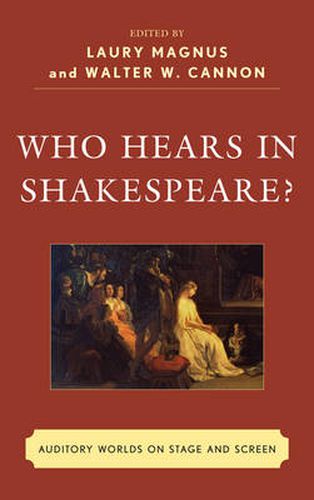Readings Newsletter
Become a Readings Member to make your shopping experience even easier.
Sign in or sign up for free!
You’re not far away from qualifying for FREE standard shipping within Australia
You’ve qualified for FREE standard shipping within Australia
The cart is loading…






This volume, examining the ways in which Shakespeare’s plays are designed for hearers as well as spectators, has been prompted by recent explorations of the auditory dimension of early modern drama by such scholars as Andrew Gurr, Bruce Smith, and James Hirsh. To look at the dynamics of hearing in Shakespeare’s plays involves a paradigm shift that changes how we understand virtually everything about them, from the architecture of the buildings, to playing spaces, to blocking, and to larger interpretative issues, including our understanding of character based on players’ responses to what they hear, mishear, or refuse to hear. Who Hears in Shakespeare? Auditory Worlds on Stage and Screen is comprised of three sections on Shakespeare’s texts and performance history: The Poetics of Hearing and the Early Modern Stage ; Metahearing: Hearing, Knowing, and Audiences, Onstage and Off ; and
Transhearing: Hearing, Whispering, Overhearing, and Eavesdropping in Film and Other Media.
Chapters by noted scholars explore the complex reactions and interactions of onstage and offstage audiences and show how Shakespearean stagecraft, actualized on stage and adapted on screen, revolves around various situations and conventions of hearing-soliloquies,, asides, avesdropping, overhearing, and stage whispers. In short, Who Hears in Shakespeare? enunciates Shakespeare’s nuanced, powerful stagecraft of hearing. The volume ends with Stephen Booth’s afterword, his inspiring meditation on hearing that considers Shakespearean audiences and their responses to what they hear-or don’t hear-in Shakespeare’s plays.
$9.00 standard shipping within Australia
FREE standard shipping within Australia for orders over $100.00
Express & International shipping calculated at checkout
This volume, examining the ways in which Shakespeare’s plays are designed for hearers as well as spectators, has been prompted by recent explorations of the auditory dimension of early modern drama by such scholars as Andrew Gurr, Bruce Smith, and James Hirsh. To look at the dynamics of hearing in Shakespeare’s plays involves a paradigm shift that changes how we understand virtually everything about them, from the architecture of the buildings, to playing spaces, to blocking, and to larger interpretative issues, including our understanding of character based on players’ responses to what they hear, mishear, or refuse to hear. Who Hears in Shakespeare? Auditory Worlds on Stage and Screen is comprised of three sections on Shakespeare’s texts and performance history: The Poetics of Hearing and the Early Modern Stage ; Metahearing: Hearing, Knowing, and Audiences, Onstage and Off ; and
Transhearing: Hearing, Whispering, Overhearing, and Eavesdropping in Film and Other Media.
Chapters by noted scholars explore the complex reactions and interactions of onstage and offstage audiences and show how Shakespearean stagecraft, actualized on stage and adapted on screen, revolves around various situations and conventions of hearing-soliloquies,, asides, avesdropping, overhearing, and stage whispers. In short, Who Hears in Shakespeare? enunciates Shakespeare’s nuanced, powerful stagecraft of hearing. The volume ends with Stephen Booth’s afterword, his inspiring meditation on hearing that considers Shakespearean audiences and their responses to what they hear-or don’t hear-in Shakespeare’s plays.